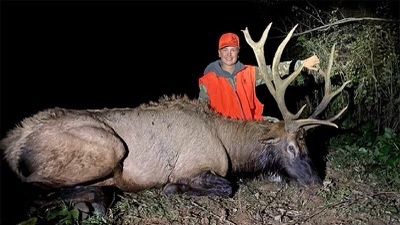Hunters harvested 47 elk during the 2020 Arkansas elk hunting season, a mirror image of the previous year’s total, according to Wes Wright, elk program coordinator for the Arkansas Game and Fish Commission.
“Of those 47 elk, 18 were harvested by hunters on public land,†Wright said. “Seven bulls and 11 antlerless elk were taken, which is a small decrease from last year, but we did decrease the number of permits available from last year.â€
Last year was the first year the public land elk permits were not drawn at the Buffalo River Elk Festival, but that didn’t prevent 5,275 applicants from putting their name in the hat. According to Wright, last year saw an increase of almost 2,000 applications for Arkansas’s coveted public land elk tags.
On private land, hunters harvested 29 elk of the possible 35 elk quota in 2020. Eleven bulls and 18 antlerless elk were taken by hunters who either owned private hunting land or had permission from a private landowner.
“We saw a small increase in private land harvest, which kept the total at the same level as last year despite the lowered public land harvest,†Wright said.
Searcy County led the elk region of Arkansas in harvest with 30 animals taken from within its borders, while Newton County accounted for 12 of the elk harvested. One elk was harvested in Boone County and four were taken in Pope County.
“Pope County actually is in the statewide elk zone where hunters may harvest any single elk during an open deer season with a weapon legal for the season and large enough to be used for elk,†Wright said. “That’s encouraging to see some of those hunters in that zone be able to enjoy a rare opportunity to harvest an elk as well.â€
According to Wright, the decrease in permits and the private land quota was made in an effort to stabilize the population following years of higher removals from the herd.
“After chronic wasting disease was discovered, we increased the quota and began to take out target animals from the population for testing for a few years and we had begun to see some decreases in elk seen during our aerial surveys,†Wright said. “This year, we moved the quota back down to a more conservative level to reverse that trend and try to stabilize the herd.â€
All elk harvested were tested for CWD, with three returning a positive result. All of the elk that tested positive were taken in Newton County.
“This is consistent with our samples from the last few years, with about 5 percent of the elk harvested testing positive,†Wright said.
Wright says the herd has ample habitat throughout its range, with much of the AGFC’s work going to large food plots around Gene Rush Wildlife Management Area, the Buffalo National River and the recently developed Bearcat Hollow WMA.
“The addition of Bearcat Hollow really opened up a lot of opportunities for elk in Arkansas,†Wright said. “I would think that food is not a limiting factor in our elk herd.â€
